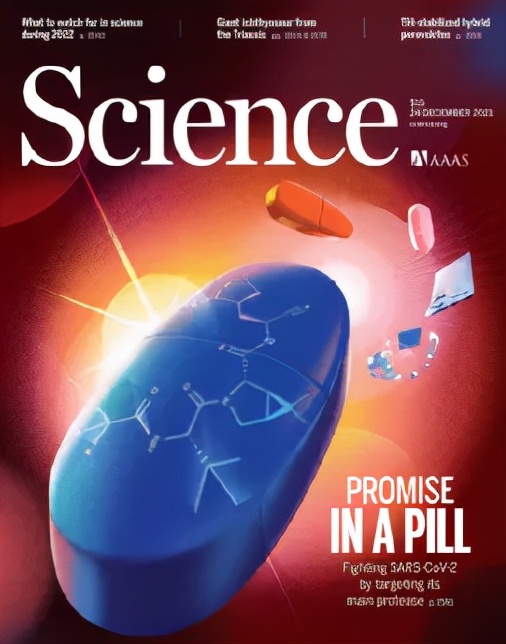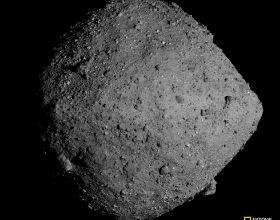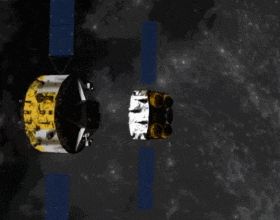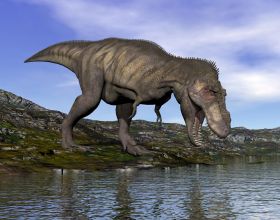編譯 | 李言
Science, 24 DEC, VOL 374, ISSUE 6575
《科學》2021年12月24日,第374卷,6575期
材料科學Materials Science
A stable aluminosilicate zeolite with intersecting three-dimensional extra-large pores
一種具有交叉三維超大孔隙的穩定鋁矽酸鹽沸石
▲ 作者:QING-FANG LIN, ZIHAO REI GAO, CONG LIN et al.
▲ 連結:
https://www.science.org/doi/10.1126/science.abk3258
▲ 摘要
沸石是一種具有重要工業應用的結晶多孔材料,例如在催化和吸附分離過程中使用。然而,進入和離開吸附和反應發生的內部密閉空間受到其孔隙孔徑的限制。具有較大孔隙、能夠處理較大分子的穩定多維沸石在精細化學工業和石油加工中是有需求的,而世界仍然依賴石油加工作為燃料。
目前已知的超大孔分子篩穩定性差和缺乏孔隙多維度,限制了它的使用。我們報告了ZEO-1,一種具有交叉三維超大孔隙的堅固的鋁矽酸鹽沸石。ZEO-1在1000°C下依然保持穩定,具有非凡的比表面積(1000平方米/克),並顯示出作為裂化催化劑的潛力。
▲ Abstract
Zeolites are crystalline porous materials with important industrial applications, including uses in catalytic and adsorption-separation processes. Access into and out of their inner confined space, where adsorption and reactions occur, is limited by their pore apertures. Stable multidimensional zeolites with larger pores able to process larger molecules are in demand in the fine chemical industry and for the oil processing on which the world still relies for fuels. Currently known extra-large-pore zeolites display poor stability and/or lack pore multidimensionality, limiting their usefulness. We report ZEO-1, a robust, fully connected aluminosilicate zeolite with mutually intersecting three-dimensional extra-large plus three-dimensional large pores. ZEO-1 is stable up to 1000°C, has an extraordinary specific surface area (1000 square meters per gram), and shows potential as a catalytic cracking catalyst.
Stabilized tilted-octahedra halide perovskites inhibit local formation of performance-limiting phases
穩定的傾斜八面體鹵化物鈣鈦礦抑制區域性效能限制相的形成
▲ 作者:TIARNAN A. S. DOHERTY, SATYAWAN NAGANE, DOMINIK J. KUBICKI et al.
▲ 連結:
https://www.science.org/doi/10.1126/science.abk1603
▲ 摘要
穩定光活性甲醯胺(FA)基鹵化物鈣鈦礦用於鈣鈦礦光伏的影響集中在立方甲醯胺碘化鉛(α-FAPbI3)相的生長,透過經驗合金與銫或甲基銨(MA)陽離子。結果表明,這種穩定的富FA鈣鈦礦是非立方的,並且在室溫下表現出約2°的八面體傾斜。
這種傾斜只有使用區域性奈米結構表徵技術才能解決,透過阻止從光活性相變到六邊形相變的轉變,賦予了相位穩定性。雖然體相似乎穩定時,異質陽離子分佈允許微觀不穩定區域的形成;我們發現這些轉變為六邊形多型,導致局域阱輔助效能損失和光不穩定性。
利用表面結合的乙二胺四乙酸,我們設計了一個八面體傾斜的純α-FAPbI3薄膜,沒有任何陽離子合金化。模板化的光活性FAPbI3薄膜對熱、環境和光脅迫都非常穩定。
▲ Abstract
Efforts to stabilize photoactive formamidinium (FA)–based halide perovskites for perovskite photovoltaics have focused on the growth of cubic formamidinium lead iodide (α-FAPbI3) phases by empirically alloying with cesium, methylammonium (MA) cations, or both. We show that such stabilized FA-rich perovskites are noncubic and exhibit ~2° octahedral tilting at room temperature. This tilting, resolvable only with the use of local nanostructure characterization techniques, imparts phase stability by frustrating transitions from photoactive to hexagonal phases. Although the bulk phase appears stable when examined macroscopically, heterogeneous cation distributions allow microscopically unstable regions to form; we found that these transitioned to hexagonal polytypes, leading to local trap-assisted performance losses and photoinstabilities. Using surface-bound ethylenediaminetetraacetic acid, we engineered an octahedral tilt into pure α-FAPbI3 thin films without any cation alloying. The templated photoactive FAPbI3 film was extremely stable against thermal, environmental, and light stressors.
Semiconductor nanochannels in metallic carbon nanotubes by thermomechanical chirality alteration
熱機械手性改變金屬碳奈米管中的半導體奈米通道
▲ 作者:DAI-MING TANG, SERGEY V. EROHIN, DMITRY G. KVASHNIN et al.
▲ 連結:
https://www.science.org/doi/10.1126/science.abi8884
▲ 摘要
碳奈米管具有螺旋結構,其中手性決定了它們是金屬還是半導體。利用原位透射電子顯微鏡,我們透過加熱和機械應變改變單壁碳奈米管的區域性手性,從而控制單個單壁碳奈米管的電子性質。
我們觀察到向更大的手性角區域過渡的趨勢,並從位錯形成能的角度來解釋。利用金屬奈米管源極和漏極之間的半導體通道共價鍵合,實現了可控的金屬-半導體過渡。此外,在溝道長度為2.8奈米的奈米管電晶體中,在室溫下表現出相干量子干涉。
▲ Abstract
Carbon nanotubes have a helical structure wherein the chirality determines whether they are metallic or semiconducting. Using in situ transmission electron microscopy, we applied heating and mechanical strain to alter the local chirality and thereby control the electronic properties of individual single-wall carbon nanotubes. A transition trend toward a larger chiral angle region was observed and explained in terms of orientation-dependent dislocation formation energy. A controlled metal-to-semiconductor transition was realized to create nanotube transistors with a semiconducting nanotube channel covalently bonded between a metallic nanotube source and drain. Additionally, quantum transport at room temperature was demonstrated for the fabricated nanotube transistors with a channel length as short as 2.8 nanometers.
物理學Physics
Terahertz light–driven coupling of antiferromagnetic spins to lattice
太赫茲光碟機動的反鐵磁自旋與晶格的耦合
▲ 作者:EVGENY A. MASHKOVICH, KIRILL A. GRISHUNIN, ROMAN M. DUBROVIN et al.
▲ 連結:
https://www.science.org/doi/10.1126/science.abk1121
▲ 摘要
理解自旋晶格耦合是現代凝聚態物理的一個關鍵挑戰,對超快和二維磁具有至關重要的意義。自旋和晶格之間角動量和能量轉移的效率,對自旋電子學、磁學和磁資料儲存中控制自旋的能力施加了基本的速度限制。
我們報告了一種由太赫茲光脈衝驅動的自旋晶格耦合的有效非線性機制。一個近單週期的太赫茲脈衝與反鐵磁體二氟化鈷中的相干磁態共振相互作用,激發拉曼活動的太赫茲聲子。結果揭示了反鐵磁體的獨特功能,允許超快自旋晶格耦合使用光。
▲ Abstract
Understanding spin-lattice coupling represents a key challenge in modern condensed matter physics, with crucial importance and implications for ultrafast and two-dimensional magnetism. The efficiency of angular momentum and energy transfer between spins and the lattice imposes fundamental speed limits on the ability to control spins in spintronics, magnonics, and magnetic data storage. We report on an efficient nonlinear mechanism of spin-lattice coupling driven by terahertz light pulses. A nearly single-cycle terahertz pulse resonantly interacts with a coherent magnonic state in the antiferromagnet cobalt difluoride (CoF2) and excites the Raman-active terahertz phonon. The results reveal the distinctive functionality of antiferromagnets that allows ultrafast spin-lattice coupling using light.
人類進化Human Evolution
The energetics of uniquely human subsistence strategies
人類特有的生存策略的能量學
▲ 作者:THOMAS S. KRAFT, VIVEK V. VENKATARAMAN, IAN J. WALLACEALYSSA N. CRITTENDEN et al.
▲ 連結:
https://www.science.org/doi/10.1126/science.abf0130
▲ 摘要
與其他類人猿相比,人類進化而來的一系列特徵,包括大腦變大、生育率提高、發育週期和壽命較長等,造成了異常高的能量消耗。人類的生存戰略如何適應我們擴大的能源預算?我們發現,與其他類人猿相比,人類狩獵採集者和自給自足的農民在生存上花費的精力更多,但時間更少,每小時獲得的能量明顯更多,並且達到了類似的能源效率。
這些發現修正了我們對人類能量進化的理解,表明人類主要透過增加能量獲取率來提供更多的能量預算,而不是透過節能的適應,如經濟的兩足行走或複雜的工具使用,以降低生活成本和提高生活的能源效率。我們認為,人類生存策略節省下來的時間為中心位置的社會互動和社會學習提供了更多的閒暇時間,這對累積的文化進化至關重要。
▲ Abstract
The suite of derived human traits, including enlarged brains, elevated fertility rates, and long developmental periods and life spans, imposes extraordinarily high energetic costs relative to other great apes. How do human subsistence strategies accommodate our expanded energy budgets? We found that relative to other great apes, human hunter-gatherers and subsistence farmers spend more energy but less time on subsistence, acquire substantially more energy per hour, and achieve similar energy efficiencies. These findings revise our understanding of human energetic evolution by indicating that humans afford expanded energy budgets primarily by increasing rates of energy acquisition, not through energy-saving adaptations such as economical bipedalism or sophisticated tool use that decrease subsistence costs and improve the energetic efficiency of subsistence. We argue that the time saved by human subsistence strategies provides more leisure time for social interaction and social learning in central-place locations and would have been critical for cumulative cultural evolution.
古生物學Paleontology
Early giant reveals faster evolution of large body size in ichthyosaurs than in cetaceans
早期巨獸揭示魚龍比鯨類更快地進化出更大體型
▲ 作者:P. MARTIN SANDER, EVA MARIA GRIEBELE, NICOLE KLEINJORGE VELEZ JUARBE et al.
▲ 連結:
https://www.science.org/doi/10.1126/science.abf5787
▲ 摘要
海洋羊膜動物的體型跨越了六個數量級,然而控制這種多樣性進化的因素在很大程度上是未知的。現代海洋初級產量的提高被認為是鯨類巨獸出現的先決條件,但這種條件不能解釋三疊紀魚龍的巨獸現象。
我們展示來自美國內華達州中三疊紀化石山動物區系的一種新的巨型魚龍Cymbospondylus youngorum sp. 11 .,它具有2米長的頭骨,強調了體型的快速進化。令人驚訝的是,化石山動物群的組成在大小範圍上可以與現代海洋哺乳動物相媲美,能量通量模型表明,在魚龍誕生後不久,中三疊世的海洋食物網能夠支援幾種處於高營養水平的大型身體魚龍。
▲ Abstract
Body sizes of marine amniotes span six orders of magnitude, yet the factors that governed the evolution of this diversity are largely unknown. High primary production of modern oceans is considered a prerequisite for the emergence of cetacean giants, but that condition cannot explain gigantism in Triassic ichthyosaurs. We describe the new giant ichthyosaur Cymbospondylus youngorum sp. nov. with a 2-meter-long skull from the Middle Triassic Fossil Hill Fauna of Nevada, USA, underscoring rapid size evolution despite the absence of many modern primary producers. Surprisingly, the Fossil Hill Fauna rivaled the composition of modern marine mammal faunas in terms of size range, and energy-flux models suggest that Middle Triassic marine food webs were able to support several large-bodied ichthyosaurs at high trophic levels, shortly after ichthyosaur origins.
















